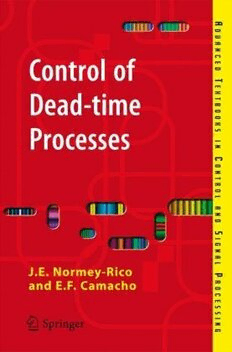Download Control of Dead-time Processes PDF Free - Full Version
Download Control of Dead-time Processes by Julio E. Normey-Rico, Eduardo Fernandez Camacho in PDF format completely FREE. No registration required, no payment needed. Get instant access to this valuable resource on PDFdrive.to!
About Control of Dead-time Processes
Industrial processes and engineering, economic and biological systems commonly exhibit time delays or dead times. Dead time complicates the analysis and design of control systems and makes satisfactory control more difficult.Control of Dead-time Processes introduces the fundamental techniques for controlling dead-time processes ranging from simple monovariable to complex multivariable cases. Solutions to dead-time-process-control problems are studied using classical proportional-integral-differential (PID) control for the simpler examples and dead-time-compensator (DTC) and model predictive control (MPC) methods for progressively more complex ones. Although MPC and DTC approaches originate in different areas of control, both use predictors to overcome the effects of dead time. Using this fact, the text analyses MPC as a dead-time-compensation strategy and shows how it can be used synergistically with robust DTC tuning methodologies.Graduate students working for their masters or PhDs in automatic control, chemical, electronic or mechanical engineering, in which dead-time processes are prevalent, will gain particular benefit from the following features of this text:• interlinked study of PID, DTC and MPC for dead-time processes in a single source;• exercises and further reading for each chapter;• extensive use of illustrations, tables and examples;• case studies based on real industrial problems with solutions that are simple to understand and easy to implement;• MATLABВR code developed by the authors to help analyse and control dead-time processes including code for all the examples in the book available fordownload from the Web.Control of Dead-time Processes will also be of interest to control researchers and process control engineers. Chapters 1-8 of the text can be used as part of the final-year course for undergraduates in control or process engineering.
Detailed Information
| Author: | Julio E. Normey-Rico, Eduardo Fernandez Camacho |
|---|---|
| Publication Year: | 2007 |
| ISBN: | 1846288290 |
| Pages: | 474 |
| Language: | English |
| File Size: | 5.209 |
| Format: | |
| Price: | FREE |
Safe & Secure Download - No registration required
Why Choose PDFdrive for Your Free Control of Dead-time Processes Download?
- 100% Free: No hidden fees or subscriptions required for one book every day.
- No Registration: Immediate access is available without creating accounts for one book every day.
- Safe and Secure: Clean downloads without malware or viruses
- Multiple Formats: PDF, MOBI, Mpub,... optimized for all devices
- Educational Resource: Supporting knowledge sharing and learning
Frequently Asked Questions
Is it really free to download Control of Dead-time Processes PDF?
Yes, on https://PDFdrive.to you can download Control of Dead-time Processes by Julio E. Normey-Rico, Eduardo Fernandez Camacho completely free. We don't require any payment, subscription, or registration to access this PDF file. For 3 books every day.
How can I read Control of Dead-time Processes on my mobile device?
After downloading Control of Dead-time Processes PDF, you can open it with any PDF reader app on your phone or tablet. We recommend using Adobe Acrobat Reader, Apple Books, or Google Play Books for the best reading experience.
Is this the full version of Control of Dead-time Processes?
Yes, this is the complete PDF version of Control of Dead-time Processes by Julio E. Normey-Rico, Eduardo Fernandez Camacho. You will be able to read the entire content as in the printed version without missing any pages.
Is it legal to download Control of Dead-time Processes PDF for free?
https://PDFdrive.to provides links to free educational resources available online. We do not store any files on our servers. Please be aware of copyright laws in your country before downloading.
The materials shared are intended for research, educational, and personal use in accordance with fair use principles.

